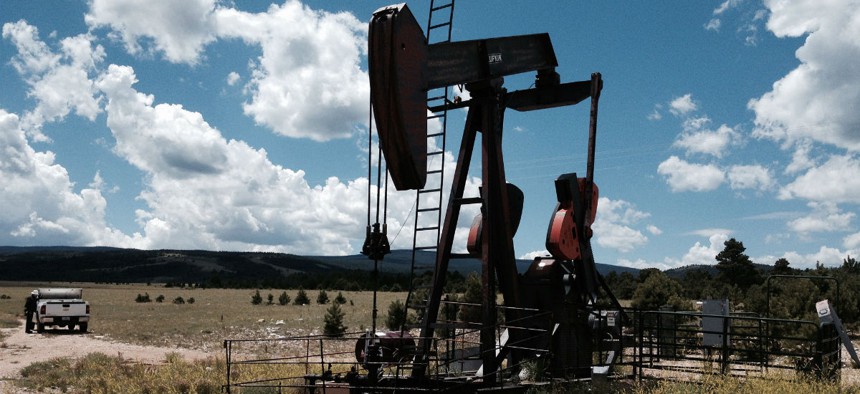
A pump jack in the Bureau of Land Management's Rawlins Field Office area of Wyoming. BLM photo courtesy of Derek Bailey
How an Influential Committee can Make Energy Royalties Great Again
A new investigation shows Americans were cheated out of billions over three decades.
President Trump has a plan for energy dominance that he says “unlocks millions and millions of jobs and trillions of dollars in wealth” by auctioning off federally owned ocean lands for oil exploration. Our new investigation reveals that the American public was cheated out of billions of dollars in revenue from such lands over the past three decades because of a broken auctioning system. However, an influential committee meeting this week has the power to fix that system by implementing important reforms to the way the public is compensated for resources extracted from public land.
American people were denied tens of billions of dollars in revenue over the last three decades thanks to a Reagan-era system that changed the government’s process for auctioning off publicly owned tracts of the seafloor to oil and gas companies for production. Although the process is supposed to ensure taxpayers receive “fair market value” for natural resources extracted from public lands, the change instead ensured that the vast majority of those tracts only receive a single bid. That has impacted the prices companies pay the public for drilling rights. For instance, adjusted for inflation, the average price paid per acre in each Gulf of Mexico auction since 1983 has declined from $9,068 to $391—a drop of 95.7 percent.
In the run-up to the most recent auction of oil drilling rights in the Gulf of Mexico, the Trump administration sweetened the deal for bidders by lowering the royalty rate for wells in relatively shallow water by a third. And Director of the Bureau of Safety and Environmental Enforcement Scott A. Angelle was videoed making the general case for low royalty rates in a September speech to the Louisiana Oil & Gas Association.
However, the influential committee tasked with reforming the royalty system has an extraordinary opportunity to turn around taxpayers’ losing streak. Interior Secretary Ryan Zinke last March chartered the latest version of the Royalty Policy Committee, which was originally created to advise the Secretary of the Interior on how much oil companies should pay the federal government to pump oil and gas and extract valuable minerals from publicly owned lands.
The Committee will meet in Houston on Wednesday to discuss creating a system that will “ensure the public receives the full value of the natural resources produced from Federal lands,” according to its charter.
The Interior Department has historically given this country’s natural resources to industry for a song; considering the makeup of the current committee, that song may keep playing.
Of the 20 primary members, 16 work within the oil, gas, and mining industries or for states and tribes heavily dependent on those industries. Several representing academia and “public interest” groups have ties to industry, raising questions about how much balance they will bring to the committee’s deliberations.
Here are three ways the committee can ensure Americans receive fair returns for their natural resources:
- Get rid of area-wide leasing. This was a system adopted in 1983 that bundles all available tracts of ocean floor in large parts of the Continental Shelf for bidding at the same time, decreasing competition. The previous system, which harnessed market forces to better determine "fair market value" for offshore drilling rights, worked well and generated greater revenue for the public.
- Update the federal onshore royalty rate of 12.5 percent. The rate hasn’t been updated since the 1920s. It should be on par with the Rocky Mountain states (16.67 percent and 18.75 percent) at minimum and Texas (25 percent) at maximum.
- Endorse legislative changes to finally impose royalties on hard rock minerals extracted from federal lands.
The public deserves a fair return for production on its lands. The members of the Royalty Policy Committee should keep in mind President Trump’s statement that “this vast energy wealth does not belong to the government.” Nor does it belong to the oil, gas, and mining industries. As the president pointed out, that wealth “belongs to the people of the United States of America.”
Laura Peterson is an Investigator at the Project On Government Oversight. She has more than 20 years of experience as an oversight watchdog on Capitol Hill and with nonprofits and the press. Her current work focuses on the environment and natural resources.






